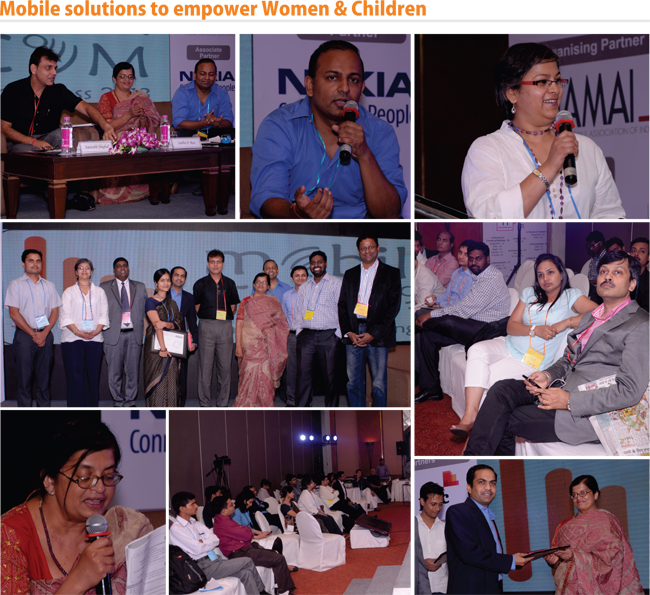Chairperson : Sudha P. Rao
Co-Chair and Moderator : Amitabh Singhal
Jury Expert: ArjunBasu
Session Manager: Mr. Syed
- Workshop presenters (name, organization):
- Mr. Satish, My Baby Diary, TeliBrahma Convergent Communications Pvt. Ltd., India
- PriyankaDutt, Project Director, Mhealth Services Mobile Kunji and Mobile Academy, BBC Media Action
- ShamarukhAlam, Director, Mobile Alliance for Maternal Action (Mama), DNET, Bangladesh
- Harish Sharma, Director, Helpls, Varshyl Technologies Pvt Ltd., India
- AmitDubey, Fight Back, India
- Yogendra Singh, Home Remedies, Mango Technologies, Pvt. Ltd.
Objectives of the workshop:
- Use of growing penetration of mobile, internet, and other digital media platforms toempower women and children;
- Showcasing the best practices in terms of women and children can be empowered usingmobile services and solutions;
- Understand some of the models being implemented using mobile phones for social andbehaviour change – information/knowledge dissemination, monitoring, support to frontline workers, and inter personal communication.
The first speaker of the session, Mr. Satish shared with the audience a mobile app called My Baby Diary App, developed primarily for mothers. It tracks delivery schedules, vaccinations and captures every piece of information ranging from pre-delivery stage to up to 3 years. Through this app mothers could easily get substantial information about baby care knowledge right from pre-natal stage till they are toddlers. My Baby Diary allows mothers to set reminders for the next due vaccination. The app reached around 50000 people in 7 weeks time. Mr. Arjun, the jury expert appreciated the user-friendly interface of the app.
The next speaker, Ms. Priyanka Dutt from BBC Media Action showcased training course, called Mobile Academy to expand and refresh Community Health Worker’s knowledge of life-saving health behaviours and to enhance their communication skills. The audio course is delivered via Interactive Voice Response Technology, which is accessible from any mobile handset and contains 190 minutes of content at 50 paise/minute which is a fraction of the cost of face-to-face training. Another multi-media service call Mobile Kunji, is designed to be used by community health workers (CHWs) during counseling sessions with families. It consists of printed deck of cards and an audio component that can be accessed via short codes. Mobile Kunji brings together an IVR-based mobile service and a virtually indestructible deck of 40 illustrated cards on a ring. Each card has a unique mobile short code printed on it. When a health worker dials the number which is toll-free, they can play the health message relating to different topics such as pregnancy, family planning etc, voiced by a character called Dr. Anita, an engaging but authoritative female doctor.
The third speaker Ms. Shamarukh Alam, explained to the audience that most of the mothers have access to cell-phones. Aponjon delivers health messages to pregnant women and new mothers who register to the service. The aim of this initiative is to reduce maternal mortality. Messages are received by registered mothers based on the week of pregnancy via SMS and voice recordings. Mothers can choose a designated time of day at which her phone will ring and a recorded health message would be played. The charges for the service vary depending upon the socio-economic status of the subscriber. Messages are also sent to guardians, fathers, husbands to promote inclusion.
The next speaker Harish Sharma from Varshyl Technologies Pvt. Ltd. showcased an app called Helpls. HelPls is an app designed for smart phones which during an adverse situation (such as assault etc.) sends SMS to four pre-designated phone number of friends as chosen by the user of the app letting them know that user of the app is in trouble. It also gives out details about location through GEO maps. It enables voice recordings upto 60 seconds, which is recorded in the background and mailed to the email id specified by the user. HelPls also dials emergency Police Number 100 by making a call automatically through the smart phone. A query was put up from the audience about the technology used to track the user’s location. Mr. Harish replied that Helpls uses GPS to track location of the person in trouble.
The next speaker Mr. Amit Dubey showcased FightBack a mobile application to facilitate women’s safety. When the application is launched on mobile, it starts tracking user location via GPS and updates user’s location to the backend server at predefined time interval. Once the panic button is pressed, application sends SOS SMS and email message to emergency contacts and provides them with the exact location. It can also update this data on user’s facebook page. This data can be used to avoid unsafe zones and can also be used to improve the infrastructure (increase in police patrol cars) of the identified places to make it safe for women.
The last speaker of the session Mr. Yogendra Singh, explained to the audience that home made medicines have been effectively used by our ancestors to cure common ailments. He showcased a smart phone app which provides home remedies to common ailments thereby replacing most commonly used over the counter medicines in treatment of common health problems. These remedies comprise of herbs, spice, fruits, and vegetables with no side-effects.
Summary of the session:
The session witnessed some Smart Phone apps as well as SMS and IVR based services to empower women and children.

